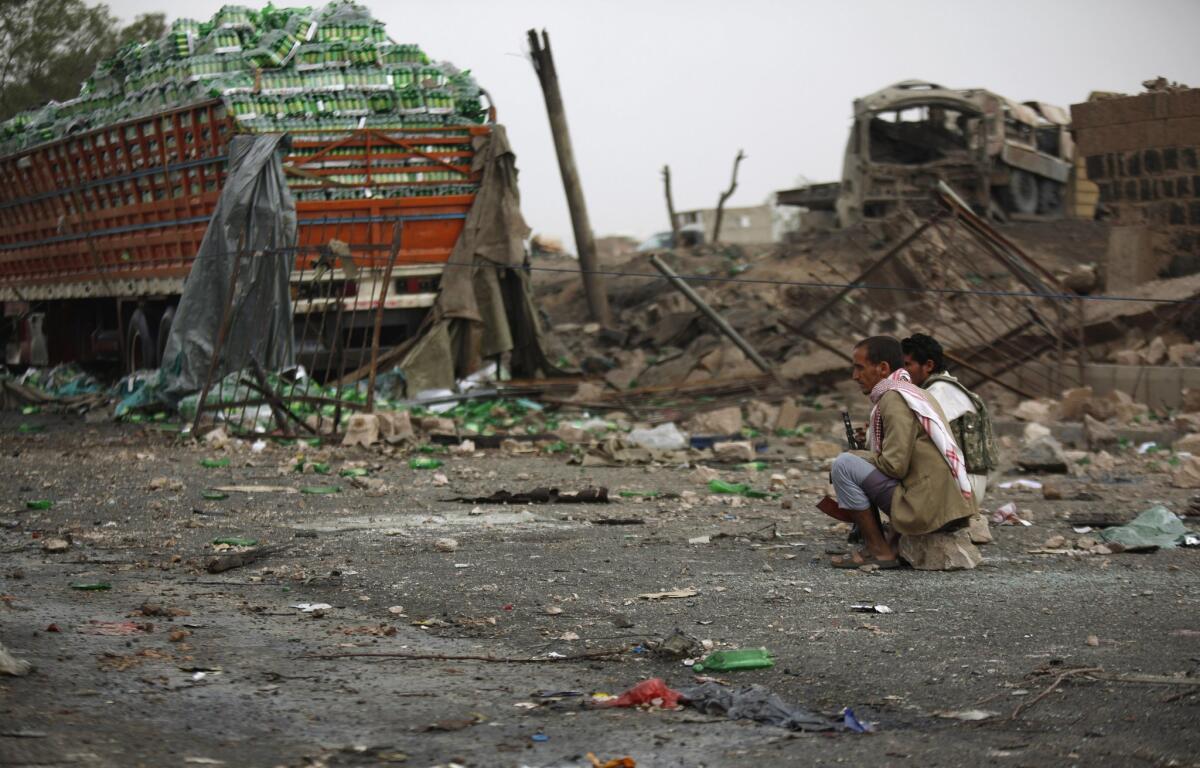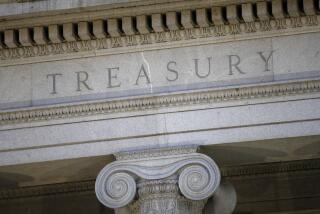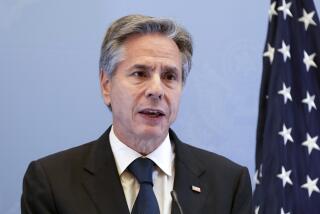Iran deal: Arab world’s cautious reaction reflects deep fault lines

Shiite Muslim Houthi fighters guard the site of airstrikes carried out in Sana, Yemen, carried out by a coalition led by Saudi Arabia. Yemen has become a focus of the rivalry between Saudi Arabia and Iran.
Reaction in the Arab world to the nuclear accord between Iran and six world powers offered little surprise Tuesday, with cautious statements largely following the geopolitical and sectarian fault lines that have come to define the region.
Saudi Arabia, Iran’s main rival in the Persian Gulf area, did not offer an official comment on the accord, despite the government’s resistance to the Obama administration’s overtures to Tehran.
However, state media carried a statement from an unnamed source widely assumed to reflect the government’s position, voicing support for a deal “that would guarantee the prevention of Iran from getting a nuclear weapon” and include a “permanent inspection mechanism.” It also called for continued sanctions on Tehran.
Saudi commentators, meanwhile, condemned the deal as one that ignored Iran’s role in the conflicts raging in Syria, Iraq and Yemen.
“The agreement restored respect to this regime that should not have been respected and should have been punished not just for its nuclear program but also for its aggressive behavior in the area,” said Saudi journalist Jamal Khashoggi on the Qatar-based Al Jazeera news channel.
“Has the situation changed in Syria?” he asked, citing Iranian assistance to Syrian President Bashar Assad’s government, which for more than four years has been battling rebels, some backed by Saudi Arabia. “How will [Iran] be when it is free of these sanctions?”
Khashoggi also lauded the Saudi leadership for its air campaign against the Houthi rebels in Yemen, which the Saudi government says are backed by Iran.
“The kingdom [of Saudi Arabia] continues to lead the area toward getting rid of the Iranian disease and rebuilding the area anew,” he asserted.
Saudi Arabia, a predominantly Sunni Muslim nation, has long accused Shiite Muslim-led Iran of fomenting rebellion among Shiites in the Gulf region, even as Tehran pursued a nuclear deal with six world powers.
“Geo-strategically, I don’t think we’ll see many shifts, because the Gulf states, especially Saudi Arabia, view Iran as a traditional enemy and an existential threat,” Fawaz Gerges, professor of international relations at the London School of Economics and Political Science, said Tuesday in a telephone interview.
“The Saudi-Iranian fault line is big and more dangerous at this stage because it has taken sectarian overtones. … The deal might even reinforce the fears of the Arab Gulf states.”
While some of Saudi Arabia’s regional allies were largely silent, the United Arab Emirates and Kuwait offered mild praise for the agreement.
The UAE expressed “hope that the agreement will contribute to regional security and stability,” according to a statement released on the emirates’ state news agency WAM.
Kuwait’s leader, Sabah al Ahmed al Jabbar al Sabah, sent telegrams of congratulations to the heads of state of the seven nations involved in the negotiations, hoping the agreement would “strengthen the security and stability of the area,” according to a statement released by Kuwait state news operator KUNA.
In Syria, the main beneficiary of Iranian largesse in the region, Assad expressed “his most sincere heartfelt congratulations” to Iran for achieving what he described as “this great victory,” according to the official Syrian Arab News Agency.
Assad also added a mention of the extensive financial, logistical and military assistance his government in has received from Iran.
“We are reassured that the Iranian Islamic Republic will continue and with greater momentum supporting the just causes of the peoples and working to bring about peace and stability in the region and the world,” he said.
The Shiite-led government in Iraq applauded the agreement even as the nation’s oil ministry geared up to increase exports to compensate for a decline in prices the deal is expected to bring, according to a statement released Tuesday on the Iraqiya news channel.
The Iraqi leadership has tried to walk a fine diplomatic line between its alliances with neighboring Iran and the U.S., which toppled Saddam Hussein’s government in 2003, enabling the nation’s Shiite majority to assume control. A thaw in U.S.-Iranian relations could aid Baghdad as it counts on its two major allies for support in its battle against Islamic State, an extremist Sunni group that how holds large swaths of Iraqi territory.
The anticipated decline in oil prices, however, is liable to create problems for the Iraqis.
“Iraq will face acute difficulty,” Ben Lando, editor in chief of Iraq Oil Report said Tuesday in an email interview, noting that Baghdad “needs the revenues to pay rising the security costs all while it deals with massive reconstruction needs within a historically mismanaged budgetary process.”
Bulos is a special correspondent.
More to Read
Start your day right
Sign up for Essential California for news, features and recommendations from the L.A. Times and beyond in your inbox six days a week.
You may occasionally receive promotional content from the Los Angeles Times.







